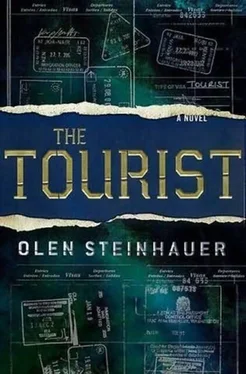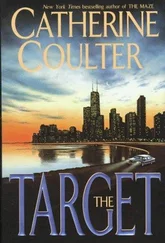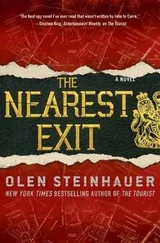He was tall, fiftyish, with wavy gray hair and a bright smile. Despite heavy eyes that matched Charles's, he had a youthful vitality about him.
After the introductions, he led them to the overdesigned sofas. "Now, please. Tell me what I can do for my American friends."
Angela handed over her photograph of Frank Dawdle. Ugrimov slipped on some wide Ralph Lauren bifocals and tilted it in the failing evening light. "Who's this supposed to be?"
"He works for the American government," said Angela.
"CIA, too?"
"We're just embassy staff. He's been missing three days.”
“Oh." Ugrimov handed back the photo. "That must be troubling."
"It is," Angela said. "You're sure he hasn't come to see you?”
“Nikolai," said Ugrimov, and in Russian asked, "Have we had any visitors?"
The bodyguard rolled out his lower lip and shook his head.
Ugrimov shrugged. "Nothing, I'm afraid. Perhaps you can tell me why you think he would come here. I don't know this man, do I?"
Charles said, "He was looking into your life just before he disappeared."
"Oh," the Russian said again. He raised a finger. "You're telling me that someone at the American embassy in Vienna has been looking into my life and works?"
"You'd be insulted if they didn't," said Charles.
Ugrimov grinned. "Okay. Let me offer some drinks. Or are you on the job?"
To Charles's annoyance, Angela said, "We're on the job," and stood. She handed over a business card. "If Mr. Dawdle does get in contact with you, then please call me."
"I'll be sure to do that." He turned to Charles. "Do svidaniya."
Charles repeated the Russian farewell back to him.
Once they were down the steps and in the dark street, the air moist and still warm, Angela yawned again and said, "What was that?"
"What?"
"How'd he know you spoke Russian?"
"I'm telling you, I need a new name." Charles looked up the length of the street. "The Russian community's not so big."
"Not so small either," said Angela. "What're you looking for?"
"There." He didn't point, only nodded at a small sign at the corner indicating an osteria. "Let's take a long walk around to there. Eat and watch."
"You don't trust him?"
"A man like that-he'd never admit it if Dawdle came to him."
"Watch if you want. I need some sleep."
"How about a pill?"
"First one's free?" she said, then winked and stifled another yawn. "I have embassy drug tests to contend with."
"Then at least leave me one of your cigarettes."
"When did you start smoking?"
"I'm in the midst of quitting."
She tapped one out for him, but before handing it over said, "Is it the drugs that do it to you? Or the job?”
“Do what?"
"Maybe it's all the names." She handed over the cigarette. "Maybe that's what's made you so cold. When you were Milo, you were a different person."
He blinked at her, thinking, but no reply came to him.
He spent the first part of his night watch at the little osteria, looking down Barba Fruttariol, eating a dinner of cicchetti-small portions of seafood and grilled vegetables-and washing it down with a delicious Chianti. The bartender tried to start a conversation, but Charles preferred silence, so when the man rattled on about George Michael, "certainly the greatest singer in the world," he didn't bother contradicting or agreeing. The man's banter became dull background noise.
Someone had left behind a copy of the day's Herald Tribune, and he mused over the stories for a while, in particular a statement by U.S. Secretary of Defense Donald Rumsfeld that "according to some estimates we cannot track $2.3 trillion in transactions," which amounted to about a quarter of the Pentagon budget. A certain Senator Nathan Irwin from Minnesota, breaking party ties, called it "a damned disgrace." Not even that could hold his attention, though, and he folded the paper and put it aside.
He wasn't thinking about suicide, but about the Bigger Voice, that thing his mother used to discuss with him during her occasional nocturnal visits in the seventies, when he was a child in North Carolina. "Look at everyone," she told him, "and see what guides them. Little voices-television, politicians, priests, money. Those are the little voices, and they blot out the one big voice we all have.
But listen to me-the little voices mean nothing. All they do is deceive. You understand?"
He'd been too young to understand, and too old to admit his ignorance. Her visits never lasted long enough for her to explain it well enough. He was always tired when she arrived in the middle of the night to rap on his window and carry him out to the nearby park.
"I am your mom, but you won't call me mom. I won't let you be oppressed, and I won't let you oppress me with that word. You won't even call me Ellen-that's my slave name. My liberation name is Elsa. Can you say that?"
"Elsa."
"Excellent."
His early childhood was punctuated by these dreams-because that's how they felt to him: dreams of a ghost-mother's visitations with her brief lesson plans. In a year, she might come three or four times; when he was eight, she came nightly for an entire week and focused her lessons on his liberation. She explained that when he was a little older-twelve or thirteen-she would take him away with her, because by then he would be able to understand the doctrine of total war. Against whom? Against the little voices. Though he understood so little, he was excited by the thought of disappearing into the night with her. But he never did. After that intense week, the dreams never returned, and only much later would he learn that she'd died before she could bring him into the fold. In a German prison. By suicide.
Was that the Bigger Voice? The voice that spoke from the stone walls of Stuttgart's Stammheim Prison, convincing her to remove her prison pants, tie one leg to the bars on her door, the other to her neck, and then sit down with all the enthusiasm of a zealot?
He wondered if she could have done that had she kept her real name. Could she have done it if she had still called herself a mother? He wondered if he could have survived these last years, or chosen so casually to end his life, if he had kept hold of his own name.
There he was again, back to thoughts of suicide.
When the restaurant closed at ten, he again checked Ugrimov's front door, then jogged westward, sometimes frustrated by dead ends, until he'd reached the waterside porticos of the Scuola Vecchia della Misericordia. The third door, Grainger had said, so he counted to three, then, despite his stomach again acting up, lay flat on the cobblestones to reach over the edge of the walkway, down toward the rancid-smelling canal.
Unable to see, he had to do it by feel, touching stones until he felt the one that was different from the others. By now, these selected cubbyholes were over fifty years old, having been added to the architecture of postwar Europe by the members of the Pond, a CIA precursor. Remarkable foresight. Many had been discovered, while others had broken open on their own from poor workmanship, but occasionally the surviving ones proved invaluable. He closed his eyes to help his sense of touch. On the bottom edge of the stone was a latch; he pulled it, and the stone separated into his hand. He placed the lid beside himself and reached inside the exposed hole to find a weighty plastic-wrapped object, sealed airtight. He took it out, and in the moonlight ripped it open. Inside lay a Walther P99 with two clips of ammunition, all like new.
He replaced the stone's cover, returned to Barba Fruttariol, and worked his way around the area, circling the palazzo as he wandered dark side streets, always returning at different angles to watch the front door or peer up to the lights along Roman Ugrimov's terrace. Sometimes he spotted figures up there-Ugrimov, his guards, and a young girl with long, straight brown hair. The "niece." But only the guards passed through the front door, returning with groceries, bottles of wine and liquor, and, once, a wooden humidor. After midnight he heard music wafting down-opera-and was surprised by the choice.
Читать дальше
Конец ознакомительного отрывка
Купить книгу












